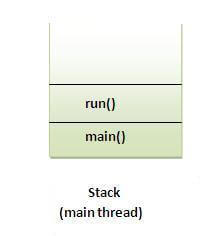What if we call run() method directly instead start() method?
- Each thread starts in a separate call stack.
- Invoking the run() method from main thread, the run() method goes onto the current call stack rather than at the beginning of a new call stack.
class TestCallRun1 extends Thread{
public void run(){
System.out.println("running...");
}
public static void main(String args[]){
TestCallRun1 t1=new TestCallRun1();
t1.run();//fine, but does not start a separate call stack
}
}
Output:running...
 Problem if you direct call run() method
Problem if you direct call run() method
class TestCallRun2 extends Thread{public void run(){for(int i=1;i<5;i++){try{Thread.sleep(500);}catch(InterruptedException e){System.out.println(e);}System.out.println(i);}}public static void main(String args[]){TestCallRun2 t1=new TestCallRun2();TestCallRun2 t2=new TestCallRun2();t1.run();t2.run();}}
Output:1243 531 2 45
| As you can see in the above program that there is no context-switching because here t1 and t2 will be treated as normal object not thread object. |
No comments:
Post a Comment